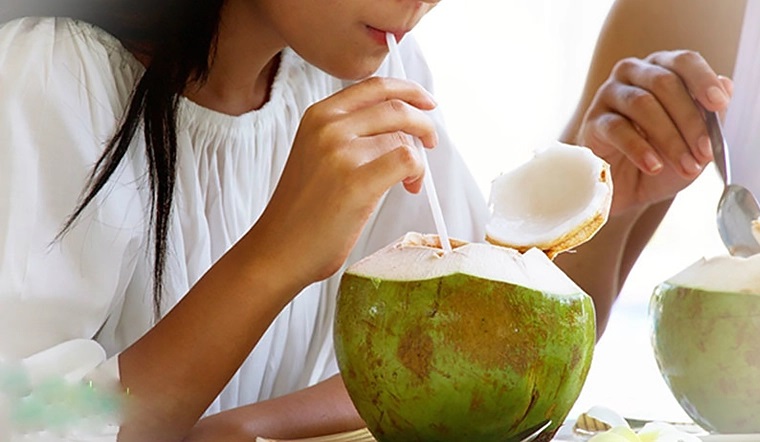Drinking Coconut Water in the Evening

Consuming coconut water in the evening can make the body more susceptible to catching a cold, especially when it’s served chilled. The combination of three cold elements (coconut water, ice, and night time) increases your risk of respiratory illnesses.
Additionally, those who practice martial arts or play soccer should avoid drinking coconut water before competitions as it may cause their tendons and muscles to relax, impacting their speed and endurance.
Drinking Coconut Water After Sun Exposure
Coconut water is not the ideal drink after sun exposure as it can lead to “catching a chill.” Common symptoms in this case include feeling chilly, having a bloated stomach, a mild fever, or even a high fever.
Moreover, if you’ve just engaged in intense physical activity or strenuous labor, refrain from drinking coconut water immediately afterward. It may cause your limbs to feel heavy and reduce your agility and quick reflexes. If you do drink it, take small sips and consume it slowly.
Giving Coconut Water to Infants
While coconut water offers numerous health benefits for babies, it is recommended to introduce it to infants only after they are six months old. Start with small amounts and gradually increase the quantity. Do not let your baby consume too much or too quickly, as it may cause bloating and digestive issues.
Furthermore, individuals with a predominantly yin constitution, characterized by pale skin, soft and flabby muscles, a preference for warm drinks, a tendency to gain weight, slow digestion, etc., should refrain from consuming coconut water.
Regular Coconut Water Consumption
It is advisable to limit your coconut water intake to 1-2 coconuts per day and not make it a daily habit, especially if you are overweight. Drinking the water from two coconuts provides you with 140 kcal, equivalent to half a bowl of rice. You would need to walk for 45 minutes or cycle for 20 minutes to burn off those calories. Therefore, if you are overweight or obese, consider reducing your calorie intake from other foods when you drink coconut water.
Additionally, pay attention to the sugar content in coconut water. As a general rule, the amount of quickly absorbed sugar an individual consumes in a day should not exceed 10% of their daily energy intake, which is approximately 180-200 kcal. So, when you drink coconut water, limit your consumption of other sugary fruits and beverages.

Notes on Drinking Coconut Water:
- The best time to drink coconut water is in the morning or at noon to balance the yin and yang elements in the body. Avoid drinking it when you are extremely hungry or full. Adding a pinch of salt can aid digestion and prevent bloating.
- Coconut water is best consumed straight from the fruit, as it loses some of its flavor and nutrients once removed from the coconut. The sooner you drink it after harvesting, the more nutrients it retains.
- While coconut water has many health benefits, it should not be consumed in excess (more than 3-4 coconuts per day) or for extended periods.
The Morning Beverage Trio: A Healthy Habit or a Nighttime Toxin?
“Starting your day with a glass of warm lemon water is a healthy ritual, but drinking certain beverages in the evening can be detrimental to your health. Some drinks are best enjoyed in the morning, while others are better left for daytime consumption if you want to maintain your health and well-being.”
The Ultimate Guide to Braised Pork Belly: A Hearty and Flavorful Dish for a Cozy Rainy-Day Meal
The tantalizing flavors of braised pork belly have long been a staple in Vietnamese cuisine. This hearty dish, known as ‘thịt kho tàu’, is a flavorful masterpiece that deserves a place in your culinary repertoire. With its tender, melt-in-your-mouth meat and a rich, savory sauce, it’s a dish that demands attention. Today, we’ll guide you through the art of crafting this delicious delicacy, ensuring your taste buds embark on an unforgettable journey.



































